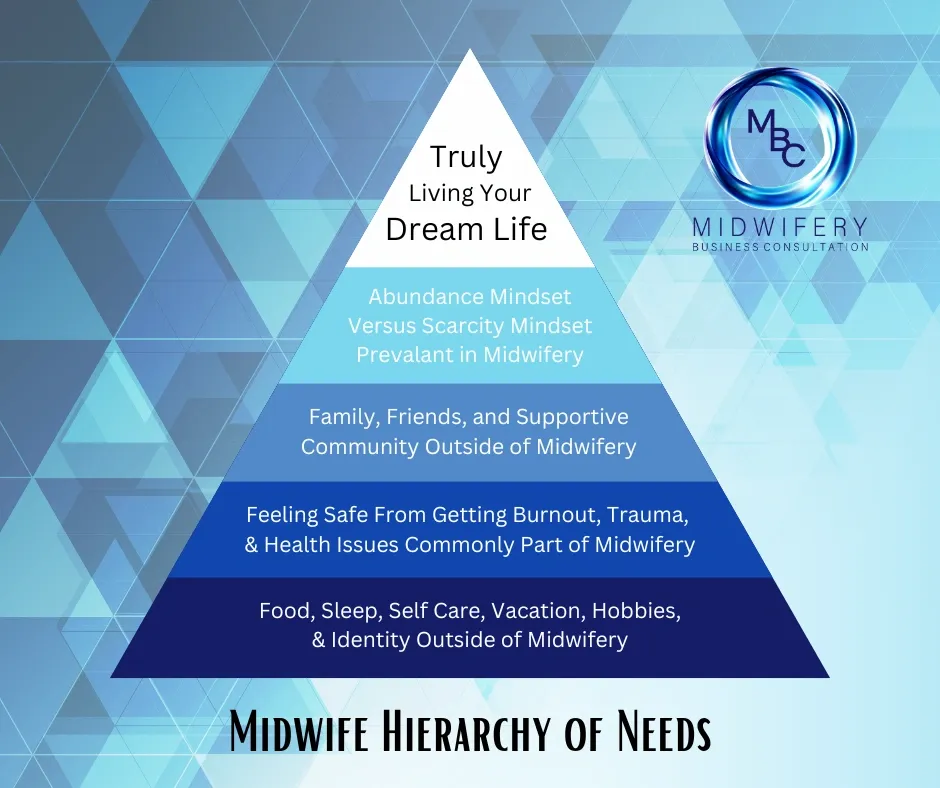Midwife Maslow Hierarchy of Need
The Midwife Maslow Hierarchy of Needs is a powerful adaptation of Abraham Maslow’s foundational psychological theory, systematically describing human motivation and arranging needs from the most fundamental physiological requirements to higher-level psychological pursuits. While Maslow’s original hierarchy is traditionally applied to individuals in a general context, this adapted framework profoundly illuminates the specific needs and priorities of midwives as essential healthcare professionals, offering a comprehensive lens through which to understand and support their well-being and professional growth.
Here’s a “Midwife Maslow Hierarchy of Needs” to illustrate the key priorities and needs of midwives in their practice:
Physiological Needs:
- Personal Health and Safety: Midwives are obligated to proactively prioritize their own health and safety, encompassing both physical well-being and mental resilience. This foundational self-care ensures they remain fully capable and effective in providing compassionate, high-quality care to others, preventing personal depletion from compromising professional duties.
- Adequate Rest and Nutrition: Essential for sustaining the demanding nature of their work, adequate rest and proper nutrition are critical components of a midwife’s healthy lifestyle. Sufficient restorative sleep and balanced sustenance directly impact energy levels, mental clarity, and focus, enabling them to endure long shifts and make sound clinical judgments with sustained vigilance.
Safety and Security:
- Workplace Safety: Midwives require a fundamentally safe and secure working environment, free from physical hazards, violence, and infectious disease risks, enabling them to provide care without unnecessary or undue personal peril. This includes adequate staffing, functional equipment, and protocols that prioritize their physical well-being.
- Legal Protections: Robust legal and professional protections are paramount. This encompasses comprehensive malpractice insurance, adherence to clear regulatory frameworks, and supportive legislation that defines scope of practice and provides safeguards against unfounded claims. Such protections are vital to ensure midwives can practice securely, confidently, and without the constant threat of legal vulnerability, ultimately benefiting both the provider and the patient.
Belongingness and Social Needs:
Both a supportive team and a strong professional network are vital components within the Midwife Maslow Hierarchy of Needs, directly addressing their essential need for belonging and esteem.
- Supportive Team: Within their immediate work environment, midwives critically require a supportive team where they feel genuinely valued, respected, and actively supported by their colleagues and superiors. This sense of belonging fosters psychological safety, encourages open communication, and is fundamental for mitigating stress and enhancing job satisfaction, directly impacting their capacity to provide high-quality care.
- Professional Network: Beyond their immediate team, building and maintaining a robust professional network within the broader midwifery community and healthcare industry is equally crucial. This wider connection reinforces a sense of belonging to the profession as a whole, facilitates invaluable knowledge-sharing, offers diverse perspectives, and provides avenues for mentorship and collaboration that are essential for continuous growth and resilience.
Esteem Needs:
- Professional Development: Midwives seek opportunities for continuous learning and professional growth to enhance their competence and confidence.
- Recognition and Respect: Recognition of their expertise and contributions by peers, patients, and the healthcare community is important for midwives’ self-esteem.
Self-Actualization:
- Autonomy and Scope of Practice: Midwives aim to practice to the full extent of their abilities and training, including making clinical decisions independently within their scope of practice.
- Advocacy and Leadership: Achieving self-actualization may involve advocacy for the profession, taking on leadership roles, and contributing to the advancement of midwifery care.
Transcendence:
- Impact on Maternal and Infant Health: For many midwives, the ultimate goal is to make a positive and lasting impact on the health and well-being of expectant mothers and newborns.
- Mentoring and Legacy: Sharing knowledge, mentoring future midwives, and leaving a legacy of compassionate care contribute to the sense of transcendence in midwifery practice.
This adapted hierarchy emphasizes the importance of midwives’ well-being, safety, and professional growth while ultimately aiming for the fulfillment of their higher-level needs through their commitment to improving maternal and infant health and the continued development of the midwifery profession
Midwife Maslow’s Hierarchy of Needs Conclusion
In conclusion, by consciously incorporating the Midwife Maslow Hierarchy of Needs into practice, we ensure that the fundamental well-being of the midwife, as a professional, is comprehensively addressed. Furthermore, by attending to the physical, emotional, and psychological needs of both the midwife (at each level of their own hierarchy) and, consequently, the mothers and newborns they care for, midwives are empowered to provide truly holistic and compassionate care. This dual focus on the needs of the caregiver and the recipient promotes overall well-being and positive health outcomes for all involved.
Ultimately, this approach profoundly underscores the essential and irreplaceable role of midwives in cultivating a supportive, nurturing, and secure environment throughout the transformative childbirth journey.



